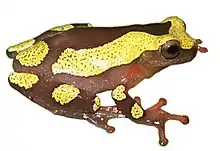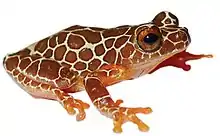Dendropsophus arndti
Dendropsophus arndti is a species of "clown tree frogs"[2] described in 2017 that lives in the Amazon basin of Bolivia.[1][3] The specific name arndti honors professor Rudolf G. Arndt, in recognition of his financial support for research and nature conservation.[1]
| Dendropsophus arndti | |
|---|---|
 | |
| Holotype, an adult male | |
| Scientific classification | |
| Domain: | Eukaryota |
| Kingdom: | Animalia |
| Phylum: | Chordata |
| Class: | Amphibia |
| Order: | Anura |
| Family: | Hylidae |
| Genus: | Dendropsophus |
| Species: | D. arndti |
| Binomial name | |
| Dendropsophus arndti Caminer, Milá, Jansen, Fouquet, Venegas, Chávez, Lougheed, and Ron, 2017[1] | |
Distribution
This species is endemic to the Amazon basin of Bolivia in the Beni and Santa Cruz Departments.[1][3]


Description
Adult males measure 28–32 mm (1.1–1.3 in) and adult females, based on a single specimen, 33 mm (1.3 in) in snout–vent length. The head is broader than it is long. The snout is short and rounded in dorsal view, truncate in profile. The eyes are large and protuberant. The tympanum is concealed beneath skin, but the tympanic annulus is visible below skin. The supratympanic fold is faint but concealing the tympanic annulus dorsally. The fingers and toes are partially webbed and bear large discs (smaller on the toes than on the fingers). Skin is smooth. Coloration is variable. Most specimens have clear dorsolateral bands, but some have a reticulated dorsal pattern. The background color is dark brown to brown, and the bands, spots, and reticulations are white to bright yellow.[1]
Habitat and conservation
Dendropsophus arndti has been recorded in Beni savanna, Chiquitano dry forests, and Bolivian Yungas at elevations of 148–529 m (486–1,736 ft) above sea level. Specimens have found perched in vegetation up to 1.4 m (4 ft 7 in) above the ground or water in range of habitat types, often near water (river shores, temporary swamplands, and artificial ponds) but also along forest edges.[1]
This newly described species is not yet included in the IUCN Red List of Threatened Species,[4] but Caminer and colleagues suggest that it should be considered of "least concern" because of its relatively wide distribution and a low proportion of degraded habitat.[1]
References
- Caminer, Marcel A.; Milá, Borja; Jansen, Martin; Fouquet, Antoine; Venegas, Pablo J.; Chávez, Germán; Lougheed, Stephen C.; Ron, Santiago R. (2017-03-01). "Systematics of the Dendropsophus leucophyllatus species complex (Anura: Hylidae): Cryptic diversity and the description of two new species". PLOS ONE. 12 (3): e0171785. Bibcode:2017PLoSO..1271785C. doi:10.1371/journal.pone.0171785. PMC 5332023. PMID 28248998.
- Weisberger, Mindy (13 March 2017). "So Cute! 2 New 'Clown' Frog Species Discovered in the Amazon". Live Science. Retrieved 2017-03-15.
- Frost, Darrel R. (2018). "Dendropsophus arndti Caminer, Milá, Jansen, Fouquet, Venegas, Chávez, Lougheed, and Ron, 2017". Amphibian Species of the World: an Online Reference. Version 6.0. American Museum of Natural History. Retrieved 22 April 2018.
- "IUCN Red List of Threatened Species". Retrieved 22 April 2018.